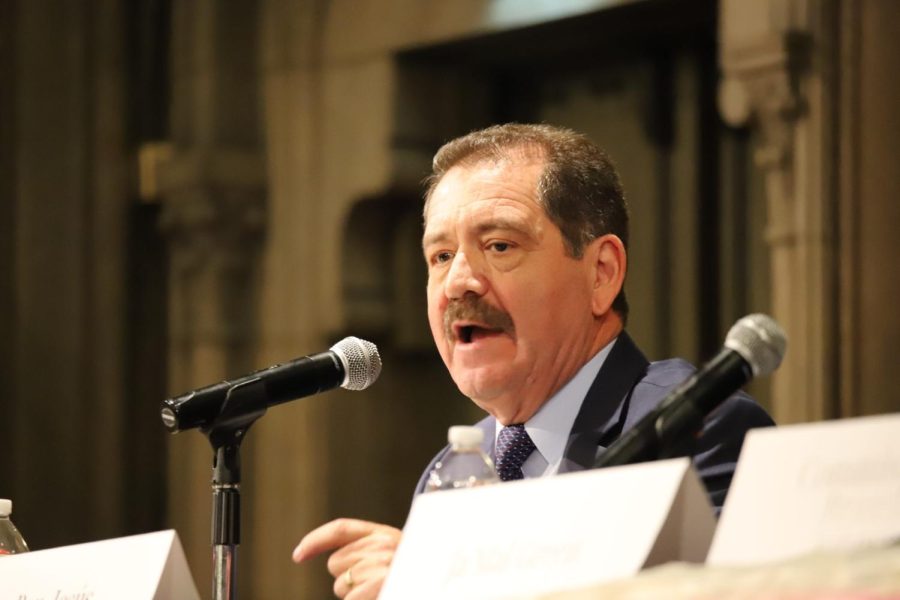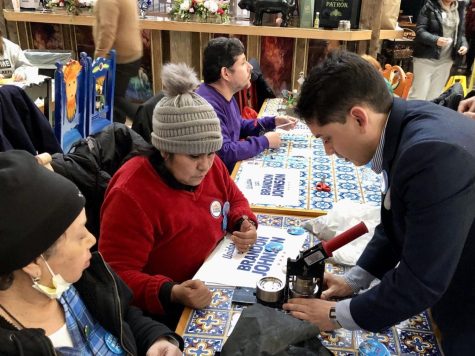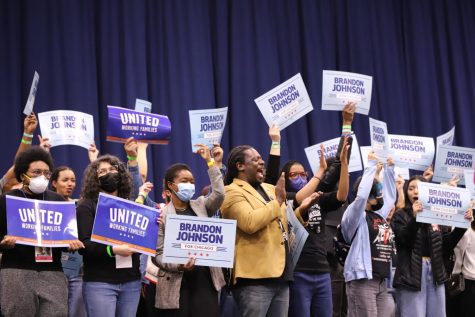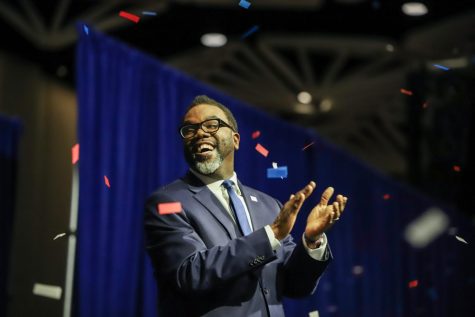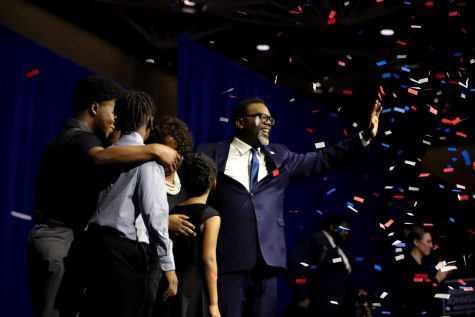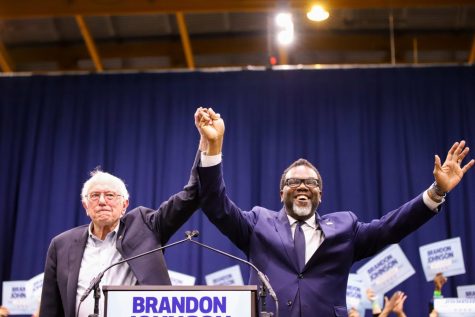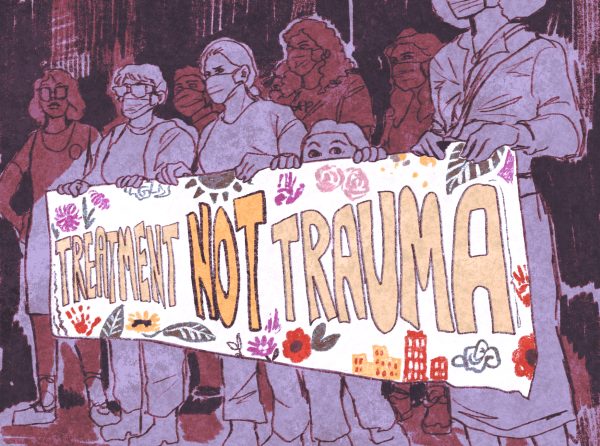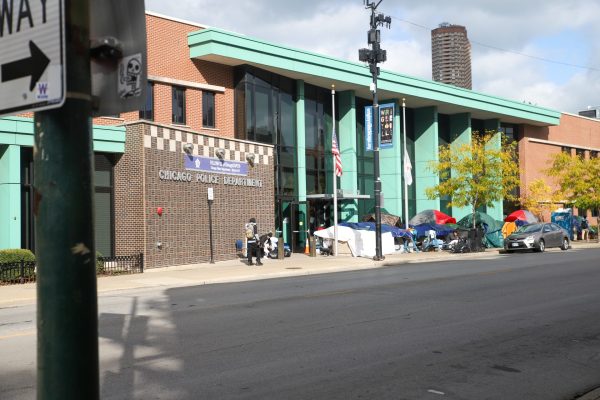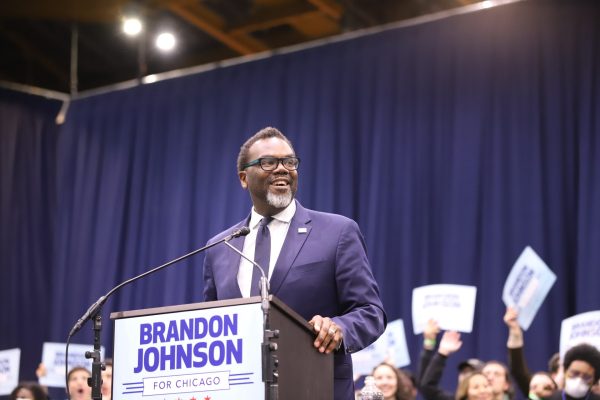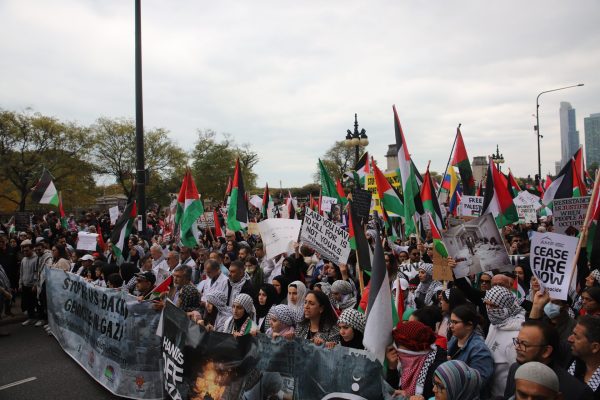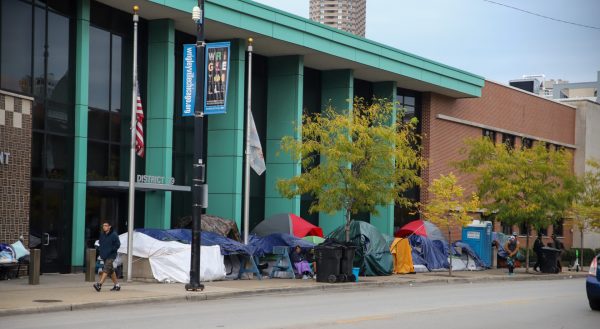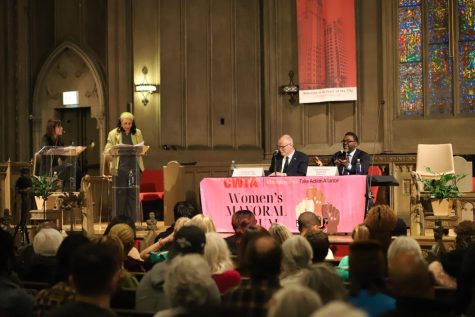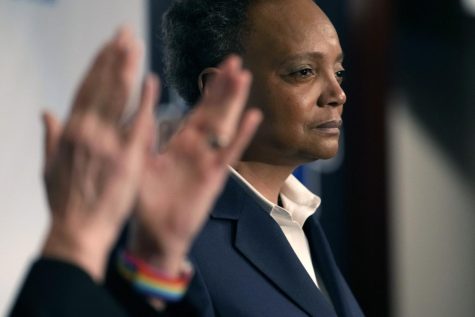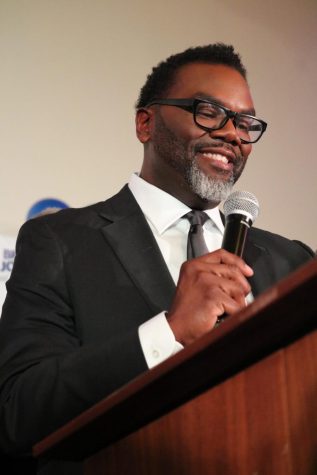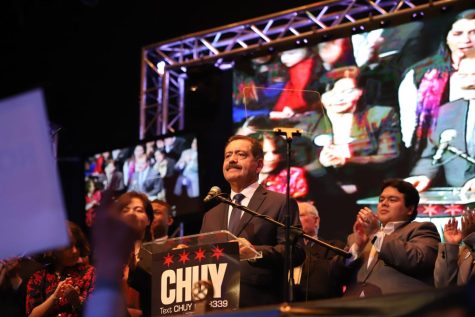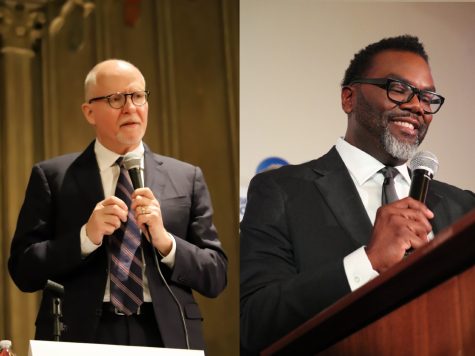Some Latino voters question Jesús ‘Chuy’ García’s ability to build coalition across communities
illinois 4th District Representative Jesús “Chuy” García speaking at the Chicago Temple during the Women’s Mayoral Forum.
Lenin M. Plaza, a political science DePaul alum, was 15 years old when his interest for politics was sparked. He volunteered for U.S. Rep. Jesús “Chuy” García’ s campaign in 2015. As a former DACA recipient from Ecuador, he once lived in constant fear of deportation.
“Politics has always affected my life as to: if I could get a state ID, if I could get Social Security, if I could get a job, if I could even be here,” Plaza said.
His experience helped to shape his support for U.S. Rep. for Illinois’s 4th congressional district Jesús “Chuy ” García, an immigrant, first-generation Mexican American who has a history of supporting initiatives that help Latino immigrant communities. García passed an ordinance ending Cook County’s cooperation with Immigration and Customs Enforcement Agency (ICE) in 2011.
Plaza is still not eligible to vote in Chicago’s looming mayoral election, but if he could, he said he would support García.
He said García’s history of helping build a coalition — a temporary alliance of different parties, persons, or states for joint action between African American and Latino voters with Chicago’s first Black Mayor Harold Washington — is one of the reasons he was drawn to García.
Their coalition efforts propelled Washington to win in 1983, when African American and Latino communities felt excluded from the political process, according to The Chicago Reporter.
“He has the history and track record to show he’ll get the job done,” Plaza said.
García’s political experience spans nearly 40 years. He was a member of the Chicago City Council, Cook County Board Commissioner and currently serves as a congressman in the House of Representatives.
Though Plaza said he is not basing his vote off their similar ethnic identity, he resonated with García because of it.
“I feel like it’s my responsibility and duty to support someone who’s made my life easier, or who’s walked my path,” Plaza said.
Identity politics— the tendency for people of a particular social, ethnic, and religious background to form political alliances — is not the only factor many Latinos consider when selecting a candidate.
William ‘KiD’ Guerrero, a candidate running for a seat in the 12th Police District Council which includes parts of West Town, West Loop, Pilsen, Ukrainian Village and East Garfield Park, was recently endorsed by Cook County Commissioner and mayoral candidate Brandon Johnson.
He said he acknowledges the work García accomplished with Washington, however, he is not convinced he can address the community’s pressing concerns.
The issues that matter the most to Chicagoans going into the elections include crime, the Chicago Transit Authority and economic development according to a survey conducted by WBEZ.
Guerrero said that though “it would be historic to have the first Latino mayor,” he will back Johnson because of his support of the ‘Treatment Not Trauma’ proposal.
The proposal would reduce the Chicago Police Department’s $1.94 billion budget to reopen mental health clinics and establish a program that would send health professionals to calls for help from those in crisis, according to WTTW News.
Even though García has endorsed parts of the plan, Guerrero said one of his priorities is lowering crime and feels that García is not doing enough to address that issue.
“We go through a lot of violence you know, I wish we didn’t have,” Guerrero said.
Political science professor and Latino voting expert Dr. Joe Tafoya, said African American and Latino communities should try to “get on the same page with what’s wrong in their communities” referring to issues in unemployment and education to form a stronger coalition. Tafoya is a supporter of García.
But Tafoya said that though the two communities have “shared grievances,” African American and Latino communities will fight over the relocation of immigrants from Texas to Chicago, hindering their chances of forming a coalition.
Texas Republican Gov. Greg Abbott has bussed migrants to sanctuary cities like Chicago since last August, amid criticizing the Biden administration’s attempt to lift Title 42, a federal act which authorizes denying asylum seekers in the U.S. during the Covid-19 pandemic.
The influx of migrants has caused city officials and communities to grapple with where to house them.
Community members in Woodlawn, a South Side neighborhood where nearly 83% of residents are Black according to the Chicago Metropolitan Agency for Planning Data, recently opposed turning Wadsworth Elementary School into a temporary housing unit for arriving migrants.
Tafoya said the recent migrant crisis is leading African American and Latinos to speak up for their community’s while competing for resources the city has not adequately provided for either community, they say.
He added that when historically underserved communities are placed “at the bottom of the barrel, they are going to be fighting for scraps.”
He said it’s going to take “a good public communicator” to help bring African American and Latino communities together behind a common mayoral candidate.
DePaul Latino Studies professor Lourdes Torres and García supporter said any politician that has a history of working across communities is worth supporting.
“Nothing that happens in this city or any state or in this country happens through the power of one group alone,” Torres said.
Antoine Givens, García’s campaign Communications Director said in an email statement to La DePaulia, “Congressman García’s coalition building is clear: from co-founding Chicago’s first independent political progressive organization alongside Rudy Lozano and a Brown, Black, and Caucasian coalition, to leading a hunger strike for a new school serving predominantly Latino and Black students in Little Village and North Lawndale – that Paul Vallas opposed, to working in Congress on progressive legislation like the John Lewis Voting Rights Act – he has been consistent over 40 years. He’s written bills into law that fund carbon monoxide detectors in public housing and protect working people from predatory payday lenders.”
“The Congressman is the only candidate in this race that has put forth a Women’s Policy platform elevating the need to address maternal mortality rates for Black and Brown people who can become pregnant and a LGBTQ+ policy platform that highlights the need to support and expand the Hire Trans Now program,” Givens stated.
Although Latinos are a central voting block, making up nearly 29% of Chicago’s population according to the U.S. Census Bureau. Tafoya said Chuy will need to create a coalition among other ethnic groups to win the election.
“No one candidate can win by winning their community,” Tafoya said.
García ranks third according to a January poll, followed by Brandon Johnson and businessman Willie Wilson. Former Chicago Public Schools CEO Paul Vallas leads the polls with 19.5% of support ahead of Mayor Lori Lightfoot.
Editor’s note: This article was edited to include a statement from García’s communications director.


